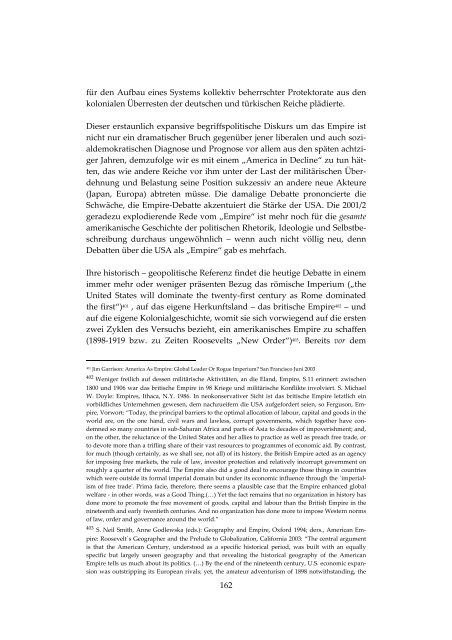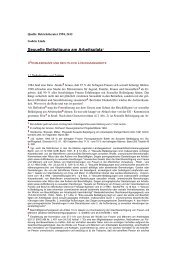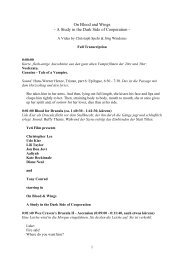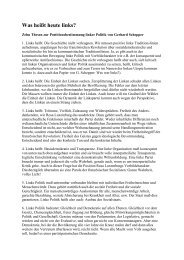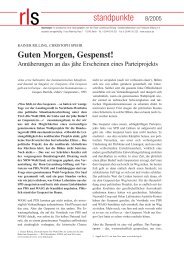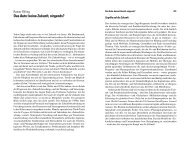outbreak. let's take over. american empire als wille ... - Rainer Rilling
outbreak. let's take over. american empire als wille ... - Rainer Rilling
outbreak. let's take over. american empire als wille ... - Rainer Rilling
Erfolgreiche ePaper selbst erstellen
Machen Sie aus Ihren PDF Publikationen ein blätterbares Flipbook mit unserer einzigartigen Google optimierten e-Paper Software.
für den Aufbau eines Systems kollektiv beherrschter Protektorate aus den<br />
kolonialen Überresten der deutschen und türkischen Reiche plädierte.<br />
Dieser erstaunlich expansive begriffspolitische Diskurs um das Empire ist<br />
nicht nur ein dramatischer Bruch gegenüber jener liberalen und auch sozialdemokratischen<br />
Diagnose und Prognose vor allem aus den späten achtziger<br />
Jahren, demzufolge wir es mit einem „America in Decline“ zu tun hätten,<br />
das wie andere Reiche vor ihm unter der Last der militärischen Überdehnung<br />
und Belastung seine Position sukzessiv an andere neue Akteure<br />
(Japan, Europa) abtreten müsse. Die damalige Debatte prononcierte die<br />
Schwäche, die Empire-Debatte akzentuiert die Stärke der USA. Die 2001/2<br />
geradezu explodierende Rede vom „Empire“ ist mehr noch für die gesamte<br />
amerikanische Geschichte der politischen Rhetorik, Ideologie und Selbstbeschreibung<br />
durchaus ungewöhnlich – wenn auch nicht völlig neu, denn<br />
Debatten über die USA <strong>als</strong> „Empire“ gab es mehrfach.<br />
Ihre historisch – geopolitische Referenz findet die heutige Debatte in einem<br />
immer mehr oder weniger präsenten Bezug das römische Imperium („the<br />
United States will dominate the twenty-first century as Rome dominated<br />
the first“) 401 , auf das eigene Herkunftsland – das britische Empire 402 – und<br />
auf die eigene Kolonialgeschichte, womit sie sich vorwiegend auf die ersten<br />
zwei Zyklen des Versuchs bezieht, ein amerikanisches Empire zu schaffen<br />
(1898-1919 bzw. zu Zeiten Roosevelts „New Order“) 403 . Bereits vor dem<br />
401<br />
Jim Garrison: America As Empire: Global Leader Or Rogue Imperium? San Francisco Juni 2003<br />
402 Weniger freilich auf dessen militärische Aktivitäten, an die Eland, Empire, S.11 erinnert: zwischen<br />
1800 und 1906 war das britische Empire in 98 Kriege und militärische Konflikte involviert. S. Michael<br />
W. Doyle: Empires, Ithaca, N.Y. 1986. In neokonservativer Sicht ist das britische Empire letztlich ein<br />
vorbildliches Unternehmen gewesen, dem nachzueifern die USA aufgefordert seien, so Ferguson, Empire,<br />
Vorwort: “Today, the principal barriers to the optimal allocation of labour, capital and goods in the<br />
world are, on the one hand, civil wars and lawless, corrupt g<strong>over</strong>nments, which together have condemned<br />
so many countries in sub-Saharan Africa and parts of Asia to decades of imp<strong>over</strong>ishment; and,<br />
on the other, the reluctance of the United States and her allies to practice as well as preach free trade, or<br />
to devote more than a trifling share of their vast resources to programmes of economic aid. By contrast,<br />
for much (though certainly, as we shall see, not all) of its history, the British Empire acted as an agency<br />
for imposing free markets, the rule of law, investor protection and relatively incorrupt g<strong>over</strong>nment on<br />
roughly a quarter of the world. The Empire <strong>als</strong>o did a good deal to encourage those things in countries<br />
which were outside its formal imperial domain but under its economic influence through the `imperialism<br />
of free tradeʹ. Prima facie, therefore, there seems a plausible case that the Empire enhanced global<br />
welfare - in other words, was a Good Thing.(…) Yet the fact remains that no organization in history has<br />
done more to promote the free movement of goods, capital and labour than the British Empire in the<br />
nineteenth and early twentieth centuries. And no organization has done more to impose Western norms<br />
of law, order and g<strong>over</strong>nance around the world.”<br />
403 S. Neil Smith, Anne Godlewska (eds.): Geography and Empire, Oxford 1994; ders., American Empire:<br />
Roosevelt`s Geographer and the Prelude to Globalization, California 2003: “The central argument<br />
is that the American Century, understood as a specific historical period, was built with an equally<br />
specific but largely unseen geography and that revealing the historical geography of the American<br />
Empire tells us much about its politics. (…) By the end of the nineteenth century, U.S. economic expansion<br />
was outstripping its European riv<strong>als</strong>; yet, the amateur adventurism of 1898 notwithstanding, the<br />
162


